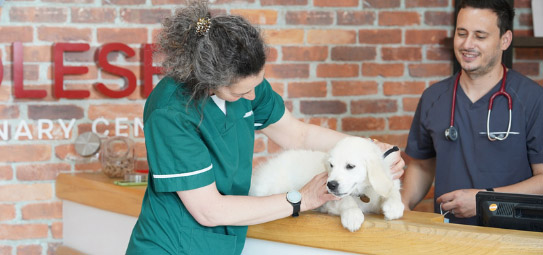
Is bad breath normal or does my pet need to see a vet dentist?
February 16, 2024
Residents of Surrey who share their homes with dogs and cats are familiar with the array of scents that accompany pet ownership. However, there’s one smell that often triggers concern: bad breath. While it’s normal for dogs and cats to experience occasional bouts of unpleasant breath, persistent halitosis may signal underlying health issues that demand prompt attention.
Vet Darren Partridge, has some helpful advice on the causes of bad pet breath and when to visit one of our Vet Dentists in Molesey. The vet nurses at Molesey Vets are also here to help and can demonstrate tooth brushing – contact us to get booked in for a pet dental demonstration.
Causes of bad dog & cat breath
Normal:
It’s not uncommon for dogs and cats to experience occasional bad breath, often caused by factors such as consuming pungent foods, chewing on specific toys, or simply waking up from a nap. If your pet’s breath quickly returns to normal after a brief period, there’s likely no cause for concern.
- Diet: According to Darren, the food your pet eats can have a significant impact on their breath. Some dog and cat foods may contribute to stronger odours, whilst high-quality diets teamed with practising good dental hygiene can help minimise it.
- Oral hygiene: Just like humans, dogs and cats need proper dental care. Without it, plaque and tartar can build up, leading to bad breath. Regular brushing and dental check-ups with our vet dentists in Molesey are essential.
- Chewing habits: Dogs (more so than cats) often chew on various objects that can affect their breath. However, the action of chewing on dental toys and (safe) bones (dogs) can help naturally clean their teeth and reduce bad breath.
Abnormal:
Persistent and extreme bad breath is not normal and is one of the signs of dental disease and some illnesses:
- Dental disease: Persistent bad breath is often a sign of dental issues such as gum disease, tooth decay, or infected gums. Darren advises that these conditions can lead to severe health problems if left untreated.
- Digestive problems: Sometimes, digestive issues can cause foul-smelling breath. Gastrointestinal problems or an upset stomach can result in odorous breath.
- Oral infections: Infections in the mouth, throat, or respiratory system can lead to bad breath. These infections need prompt medical attention.
- Underlying medical conditions: In some cases, bad breath can be a symptom of underlying medical conditions like diabetes, kidney disease, or liver problems.
When to take action
When it comes to pet health issues, it’s always preferable to prevent rather than treat, and intervening early offers the greatest opportunity for a speedy recovery. Darren advises dog and cat owners in Surrey to heed the following advice:
- Regular dental care: Establish a routine of brushing your pet’s teeth regularly and providing dental chews or toys designed to promote good oral health.
- Diet: Feed your pet a balanced diet with dental-friendly options. Talk to our team for dietary recommendations.
- Veterinary check-ups: Schedule regular check-ups with our team, including dental exams, to catch and address any potential issues early.
- Stay alert: Pay attention to changes in your pet’s breath. If it becomes consistently foul, contact us to book a dental check-up.
- Professional cleaning: When necessary, our vet dentists may recommend a professional dental scale & polish to address any existing dental problems.
Although a certain level of bad breath in dogs and cats is expected, persistent and unpleasant odours should not be overlooked. Such symptoms often indicate an underlying problem that warrants investigation. Consistent dental hygiene, a well-balanced diet, and attentive monitoring of your pet’s health are essential measures to maintain fresh breath and ensure their overall health is maintained.
Contact our Vet Dentists in Molesey to discuss your pet’s dental care and how you can help at home, or to book a dental demonstration with one of our vet nurses.
Contact us about your pet’s dental care



